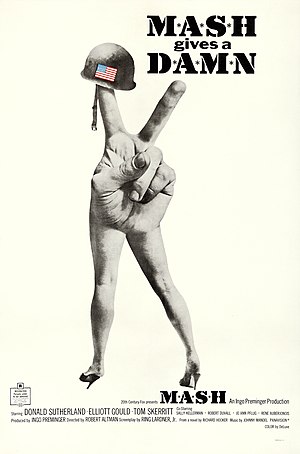M*A*S*H (film)
The following work contains material and themes that may include coarse language, sexual references, and/or graphic violent images that may disturb some viewers. Mature articles are recommended for those who are 18 years of age or above. If you are 18 years old or above, or are comfortable with mature content, you are free to view this page; otherwise, you should close this page and view another one. Reader discretion is advised. |
| M*A*S*H | ||||||||||||||||||||||||||||||
|---|---|---|---|---|---|---|---|---|---|---|---|---|---|---|---|---|---|---|---|---|---|---|---|---|---|---|---|---|---|---|
This film has been preserved in the National Film Registry in 1996.
| ||||||||||||||||||||||||||||||
 | ||||||||||||||||||||||||||||||
|
M*A*S*H is a 1970 American black comedy war film directed by Robert Altman and written by Ring Lardner Jr., based on Richard Hooker's 1968 novel MASH: A Novel About Three Army Doctors. The film is the only theatrically released feature film in the M*A*S*H franchise.
The film depicts a unit of medical personnel stationed at a Mobile Army Surgical Hospital (MASH) during the Korean War. It stars Donald Sutherland, Tom Skerritt, and Elliott Gould, with Sally Kellerman, Robert Duvall, René Auberjonois, Gary Burghoff, Roger Bowen, Michael Murphy, and in his film debut, professional football player Fred Williamson. Although the Korean War is the film's storyline setting, the subtext is the Vietnam War — a current event at the time the film was made. Doonesbury creator Garry Trudeau, who saw the film in college, said M*A*S*H was "perfect for the times, the cacophony of American culture was brilliantly reproduced onscreen".
Why It Rocks
- The film's based on a novel about the author's experiences as a doctor during the Korean War. Many viewers saw the film as a commentary on the madness of war. It features characters who don't just defy authority but flaunted their insubordination.
- It should also be mentioned that the film doesn't make specific references to battles or dates in the Korean War. This was so the film could be an allegory for America’s then-current involvement in the Vietnam War. This makes the film noteworthy for being the first war movie that echoed America's disenchantment with Vietnam, even if it did so by humiliating women, denigrating homosexuals, and mocking the sincerity and work ethic of individuals like of Major Frank Burns.
- While it may not be Robert Altman's first film, in many ways this stands as the first film with a lot of his signature trademarks, and it set the tone and style of his filmmaking for the rest of his career.
- Like the novel, the screenplay's mostly a collection of episodes and comic scenes. With no defining story arc, Altman turned the atmosphere and the chaos into the film's through-line. The jagged editing jumps from scene to scene, stitched together with a dense soundtrack of improvised lines, Japanese versions of American pop songs (a suggestion of composer Mandel), and announcements blasting from the PA loudspeakers, which Altman came up with in post-production.
- Hawkeye Pierce is the closest the film has to a moral center and Trapper John is his slightly more anarchic buddy, but unlike their TV counterparts, these guys can be downright cruel and misogynistic. In war, Altman suggests, you have to go mad to save your sanity.
- Altman insisted that his cinematographer use zoom lenses, hoping for both a documentary look and to catch actors unaware, before they started "acting".
- MASH took place on a far larger scale than Altman had used before—with up to three hundred extras, an entire front-line hospital, and all the accompanying military hardware.
- Hawkeye Pierce and Trapper John McIntyre (Gould and Sutherland's characters) are clearly the main focus in the film, but in truth, the film is an ensemble piece. Altman filled scenes with minor characters and extras doing extraneous bits of business in the background, much of it improvised and fine-tuned through rehearsals and retakes, and had microphones placed throughout the set to catch everything.
- The film features no less than 14 feature film debuts in the 28 speaking roles and Altman gave everyone their moment.
- It also helped launch the careers of Elliott Gould, Donald Sutherland, Sally Kellerman and Robert Duvall.
- It's iconic song "Suicide Is Painless", is funny enough to highlight the absurdity of its key scene: where the doctors give camp dentist "Painless" Waldowski a party (staged as a parody of The Last Supper) to stir him from his depression. It would even be used in the film's opening credits, and as the theme of the TV series (even it was only instrumental).
Trivia
- M*A*S*H was the first major American studio film to drop an f-bomb in its dialogue. The word is spoken during the football game near the end of the film by Walt "Painless Pole" Waldowski when he says to an opposing football player, "All right, Bud, your f*cking head is coming right off!"
Comments
- Mature
- Films preserved in the National Film Registry
- Films
- American films
- Good media
- Good films
- Important films
- Important media
- Full-length live-action films
- Full-length films
- 1970s films
- 1970s media
- Films featuring Donald Sutherland
- Films featuring Elliott Gould
- Black comedy films
- War films
- Box office hits
- 20th Century Studios films
- Based on books